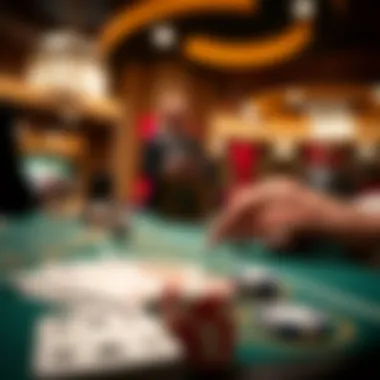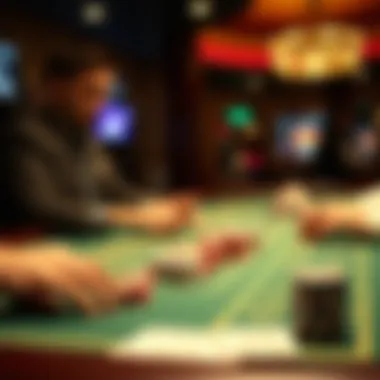Doubling Your Bet: Smart Strategies in Gambling


Intro
Doubling your bet in gambling is a concept that carries substantial weight among both amateur and experienced players. It hearkens to the age-old quest for a strategy that not only enhances one’s chances but also makes the game more exhilarating. This technique, at its core, involves increasing your wager following a loss in the hopes of recouping damages and even securing a profit. While it sounds enticing, it's vital to understand the implications this strategy brings along, including the mathematical fundamentals and psychological nuances that can make or break your gambling journey.
Whether you're at a poker table, spinning the reels of a slot machine, or betting on a sporting event, the act of doubling your bet often comes with risks that could bite back. Yet, armed with knowledge and insight, players can navigate the gambling landscape more effectively.
Let’s dive deeper into the strategies available and the insights one should consider in order to make informed decisions in this unpredictable realm.
Preamble to Betting Strategies


Betting strategies play a crucial role in gambling as they guide players in making informed decisions about their wagers. The psychology of risk, the excitement of the game, and the urge to win often lead players to the idea of doubling their bets. Understanding the rationale behind these strategies not only improves one’s betting acumen but also influences game outcomes. In this article, we will dig into the nuances of doubling your bets, showcasing its significance across various games, the odds at play, and the mental game that often goes unnoticed.
Purpose of Doubling Bets
Doubling bets serves several purposes in gambling. On a fundamental level, it functionally aims to increase potential winnings. If a player is successful, that doubling can provide significant returns. But it's not just about the mathematics; there’s also a psychological aspect. The thrill of risking more can create a heightened sense of excitement. Gamblers might believe that putting more on the line aligns with their luck or momentum during a game. Furthermore, many strategies, like the Martingale system in roulette, specifically rely on this principle, making it essential for any gambler to understand.
In a way, doubling bets can also act as a way to recoup losses. When players find themselves down, the instinct may be to take a leap of faith and gamble more in hopes of recovering what has been lost. But this can be a double-edged sword—one must tread carefully as it’s easy to sink deeper into financial trouble. Hence, considering the purpose of doubling bets goes beyond mere numbers; it includes risk assessment and psychology in high-stakes events.
Historical Context of Betting
Betting has been a part of human history for centuries, evolving from simplistic wagers in ancient civilizations to the complex systems we see today. Historical texts, such as those from ancient Rome or Greece, often allude to betting practices, though the specifics varied widely. For instance, gladiatorial battles were not just spectacles of violence but also grand betting arenas where odds changed rapidly depending on the unfolding drama.


Moreover, as gambling became institutionalized, new methods emerged, allowing for various strategies to take root. The introduction of casinos in the 17th century altered the landscape of betting, prominently incorporating games like blackjack and roulette, where players began to develop strategic approaches, including betting doubles to maximize potential gains.
Recognizing the historical context of betting strategies enriches our understanding. It shows how gambling ideas have transformed through cultures and eras, ultimately shaping modern betting systems. The very essence of doubling bets draws from these old practices, integrating tradition with fresh perspectives in today’s gaming world.
Mathematics of Doubling Your Bet
Understanding the mathematics behind doubling your bet is crucial for shaping effective gambling strategies. This aspect not only lays the groundwork for decision-making but also influences the overall success of one's gambling endeavors. By grasping the mathematical elements, gamblers can better navigate the unpredictable nature of betting, enabling them to balance risks and rewards more judiciously.
Probability and Odds


The concepts of probability and odds are fundamental to the realm of gambling. Probability refers to the likelihood of an event happening, expressed as a number between 0 and 1. Odds, on the other hand, are a ratio that represents the chances of winning versus losing. For anyone involved in betting, understanding how to interpret these numbers is essential.
When doubling a bet, players must assess the odds thoroughly. For instance, in blackjack, if the dealer shows a weak card, doubling your wager might be favorable given a higher probability of winning. Contrarily, in a game like roulette, the odds are less favorable for the player over the long run.
Here are a few points to consider when assessing probabilities and odds:
- Understand the house edge: Each game has a built-in advantage for the casino.
- Calculate break-even points: What probability do you require to cover your doubled wager?
- Analyze bets: The probabilities differ greatly between games and even within them.
Expected Value Calculations
Expected Value (EV) is a crucial method of evaluating outcomes in gambling, providing an average of what you can expect to win or lose over time. It helps in making informed decisions about whether to double your bet or stick to your original stake. Calculating EV involves multiplying each possible outcome by its probability and summing these products together.
For example, if you're considering doubling a bet in a poker game where the chances of winning the hand are 60%, while the payout for winning is a 1:1 ratio, the expected value calculation would look something like this:
plaintext EV = (Probability of Winning × Payout) + (Probability of Losing × Loss) EV = (0.6 × 1) + (0.4 × -2) = 0.6 - 0.8 = -0.2



